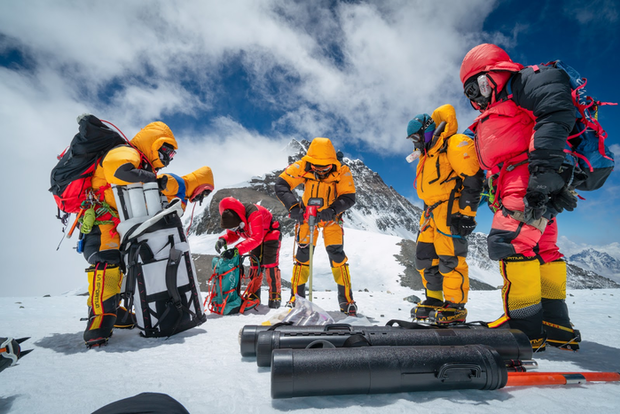Melting on Mount Everest’s highest glacier is occurring at an alarming pace, according to a study published Thursday by a University of Maine-led research team. The team’s findings suggested that ice that had taken decades to accumulate was melting away each year, jeopardizing both climbers and those who depend on the glacier for drinking water and irrigation.
Though studies on the impacts of climate change are common, little work has been done on the melting of mountain glaciers in the highest parts of the world. In early 2019, National Geographic and Rolex’s Perpetual Planet Everest Expedition began “the most comprehensive scientific investigation” ever attempted in the area, according to a press release about the study. As part of that expedition, the scientists obtained the highest-ever ice core and established the world’s two highest automatic weather stations.
By studying the ice core, taken from the South Col Glacier, as well as data from weather stations and satellite imagery, the researchers found that effects of climate change had not just reached the top of the highest mountain in the world, but had significantly altered its landscape in the last two decades. Crucially, the researchers found that the South Col Glacier has lost its snowpack — a thick covering of snow over the hard ice of the glacier — which accelerated the melting process.
The scientists found that the South Col Glacier has lost 180 feet of thickness in the last 25 years — meaning it melted over 80 times faster than the 2,000 years it took to form the top layer of the glacier. The team blamed warming air temperatures, loss of humidity, and strong winds.
“It answers one of the big questions posed by our 2019 NGS/Rolex Mount Everest Expedition — whether the highest glaciers on the planet are impacted by human-source climate change. The answer is a resounding yes, and very significantly since the late 1990s,” Paul Mayewski, expedition leader and director of UMaine’s Climate Change Institute, said in the release.
The researchers also warned that the loss of the glacier ice could lead to significantly more exposed bedrock, which could make Mount Everest climbing expeditions more dangerous in the decades to come.
“Climate predictions for the Himalaya suggest continued warming and continued glacier mass loss, and even the top of the Everest is impacted,” added Mariusz Potocki, a glaciochemist who collected the ice core.
Download our Free App
For Breaking News & Analysis Download the Free CBS News app

